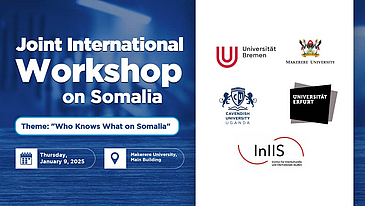Workshop Overview
The workshop on “Who Knows What on Somalia”, is part of the research project, “Knowledge Production in Peace and Security Policy” (KNOWPRO) funded by the German Ministry of Education and Research (BMBF). The major aim of the workshop is to disseminate research findings that the KNOWPRO team at Bremen University has accrued since April 2022. And broadly the workshop is part of the several efforts that have been undertaken by different actors to understand Somalia and to contribute to the efforts aimed at its pacification.
By way of background, it should be recalled that Somalia has been in turmoil since the collapse of the Siad Barre regime in January 1991. Often, the country is described as the epitome of state failure and one of the most dangerous places in the world. In March 2007, the African Union Peace and Security Council and the United Nations Security Council mandated and authorized the African Union Mission in Somalia (AMISOM)—now the African Union Transition Mission in Somalia (ATMIS) and the Uganda Peoples Defence Forces (UPDF) was the first to deploy.
Despite considerable lobbying and the prospect of significant Western security assistance, only five African countries followed Uganda—Burundi since December 2007, Djibouti since 2011, Kenya since 2012, Sierra Leone between 2013 and 2015, and Ethiopia since 2014. Many countries, that initially pledged soldiers (Ghana, Malawi, Nigeria, Tanzania), did not fulfill their promise.
Since 2010, however, a host of international actors including the United States (US), United Kingdom (UK), Turkey, and the Middle Eastern powers of Qatar, Saudi Arabia, and the United Arab Emirates have established/re-established their military presence or influence in Somalia. And recently on 14 October 2024, Egypt signed a military cooperation pact with the Somalia Government. This was quickly followed by the landing of Egyptian Air Cargo planes carrying weapons and equipment for the Somali forces. All these efforts are primarily aimed at supplanting the al-Shabaab, which is considered to be the heftiest, richest, and deadliest terror group in the world today. The downturn of the initiatives aimed at pacifying Somalia is that the different powers seem to lack a shared strategy. Competing strategies have emerged and the AU’s intervention seems much more complex than before as it now has to contend with the interests of the different actors who are either subtly or directly involved in the Somalia saga.
Understanding the myriad factors contributing to the protraction of the conflict remains challenging given the fact that the conflict is intertwined with the geopolitics of Eastern Africa and the cliff-hang interests at play in what has been put as Red Sea Arena. For particular geo-political-economic reasons actors are bent on outsmarting each other to have imprints— as bases, within the nearness of the Suez Canal. Besides the multipolar politics in the Red Sea Arena and how it has complicated the pacification of Somalia, there have also been other challenges, including local resistance, complex tribal dynamics, and issues of sovereignty and legitimacy.
This workshop, as such aims to bring together stakeholders who are either involved or concerned about the pacification of Somalia. The workshop will thus be a multi-stakeholder workshop with participants drawn from the academia, the military, government, and civil society organizations. The purpose will be to share knowledge, insights, perspectives, and policy recommendations on Somalia.
Event Management and Organisation
The event will be co-organized by the Department of Political Science and Public Administration, Makerere University, and the Institute of Intercultural and International Studies (InIIS), Bremen University, Germany. For International participants, the Department of Political Science will provide the invitation/introductory letters that will be used for Visa applications.
For more information, please contact the conveners.
Conveners:
- Dr. Jude Kagoro (University of Bremen) jude.kagoroprotect me ?!un-bremenprotect me ?!.de
- Dr. Edward Silvestre Kaweesi (Makerere University) edward.kaweesiprotect me ?!mak.acprotect me ?!.ug
Venue:
Senior Common Room, Main Building, Makerere University Kampala

